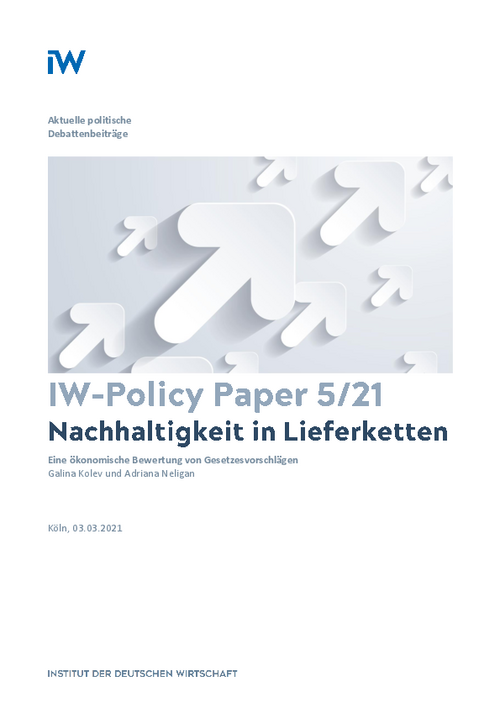In many German companies, the implementation of sustainability is already well established. However, the complexity and uncertainties of global value chains make their seamless monitoring almost impossible. There are already numerous initiatives to strengthen sustainable business practices.

Sustainability in Supply Chains: An Economic Evaluation of Legislative Proposals
IW-Policy Paper

In many German companies, the implementation of sustainability is already well established. However, the complexity and uncertainties of global value chains make their seamless monitoring almost impossible. There are already numerous initiatives to strengthen sustainable business practices.
With the agreement on a supply chain law (Lieferkettengesetz) in Germany, large companies will be obliged to check their own company as well as their direct suppliers for compliance with human rights standards. Furthermore, the EU is planning to introduce binding due diligence requirements. A corresponding draft is expected in the course of 2021. Within the framework of a legislative initiative of the EU Parliament, legislation is proposed that goes beyond the German regulations for a supply chain law.
The economic analysis in this paper suggests that the arguments in favor of a supply chain legislation often only represent a small part of reality. The intention of such a law is to internalize the negative external effects that result from the potential exploitation of natural resources and labor in countries with serious governance problems. What remains unconsidered, however, is the threatening destruction of positive effects that developing and emerging countries owe to companies from Germany and the EU if these companies withdraw their business activity. This could result from costly bureaucracy due to the supply chain law. They create jobs in developing and emerging countries, implement new and better technologies and set product and production standards. In addition, a national or even European supply chain law does not address the main problem in the affected countries, namely the weak governance that enables the exploitation of natural resources and labor. This is a global problem that requires a global solution. Currently, final demand from the EU represents trillions of dollars of value added in these countries; the 23 non-OECD countries outside the EU listed by the OECD alone, as well as Mexico and Turkey, generate 926 billion US dollars of value added, which finds its end use in the EU. Should the foreign companies behind them be confronted with excessive bureaucracy and thus with additional non-tariff trade barriers on their imports from these countries, they risk a considerable loss of competitiveness in an international context. This could lead to a withdrawal from these countries.
A European solution for more transparency and binding due diligence is clearly preferable to the threatening national solutions in order to respect and guarantee the EU's trade policy competence. But here, too, it should be ensured that the corresponding regulation takes into account today's complexity of supply chains and does not make unrealistic, prohibitive demands on tracking supplies at several stages along the supply chain.

Galina Kolev / Adriana Neligan: Nachhaltigkeit in Lieferketten – Eine ökonomische Bewertung von Gesetzesvorschlägen
IW-Policy Paper

More on the topic
![[Translate to English:] Das Gebäude des Weißen Hauses in Washington, D.C. in den Vereinigten Staaten von Amerika. [Translate to English:] Das Gebäude des Weißen Hauses in Washington, D.C. in den Vereinigten Staaten von Amerika.](/fileadmin/_processed_/c/1/csm_GettyImages-2161499385_White_House_Editorial_884306add8.jpg)
Trump or Harris or ...? What Europe must prepare for
A few months before the presidential election in the USA, Donald Trump has a good chance of being re-elected. On the Democratic side, the incumbent president has withdrawn his candidacy after a long period of hesitation, while Vice President Kamala Harris is ...
IW
Competitive pressure from China for German companies
A firm survey conducted in March/April 2024 as part of the IW-Zukunftspanel among around 900 German companies from the manufacturing and industrial services sectors shows that around 350 of the companies surveyed have Chinese competitors in their markets.
IW